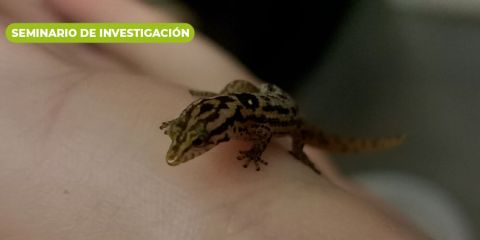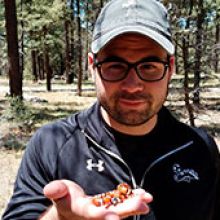
The sprightly sphaerodactyl and the imperiled crocodile (lizard): Genomic data further exemplifies dynamic sex chromosome evolution across squamates
The “genomics age” began over 20 years ago now, however, the availability of genomic data remain unevenly distributed across the tree of life, even within relatively well-known groups like amniotic vertebrates. In fact, most genomics-scale work has only accelerated in the past 5 years leading to new understandings of previously less clear phenomena, such as sex chromosome evolution. Although sex determination is a basic biological attribute and ubiquitous in vertebrates, mechanisms of sex determination vary from environmentally to genetically influenced. For example, mammals and birds have maintained stable, conserved sex chromosome systems over long evolutionary time periods, while other vertebrates, in contrast, undergo frequent sex chromosome transitions. Within squamate reptiles (>11,000 species of lizards and snakes), both evolutionarily stable and exceptional labile modes of sex chromosome evolution are thought to coexist. One group inferred to have an evolutionarily stable mode of sex determination is the infraorder Anguimorpha (a clade of charismatic taxa including monitor lizards, Gila monsters, and crocodile lizards), while the gecko lizards (infraorder Gekkota), show an exceptional lability with regard to sex chromosome transitions. Here, I summarize our recent work exemplifying how genomics have enhanced our ability to ask, and answer, complex questions in genome evolution and how these genome-scale insights can play a feedback role in helping us better understand and conserve the complex biology of the organisms with whom we share the planet.
SPEAKER

Ph. D. BRENDAN J. PINTO
Ver más

Ph. D. BRENDAN J. PINTO
Brendan is originally from Sioux City, IA (USA) where he obtained his B.S. working on population genetics of North America’s native wild rice at Morningside University. He then obtained his Ph.D. in Milwaukee, WI (USA) primarily studying sex chromosomes and speciation in Neotropical leaf-litter geckos. In pursuit of better understanding the role of sex chromosomes and sex determination in animals, Brendan now participates in exciting collaborations in diverse animal groups within and beyond squamate reptiles (lizards and snakes) including: insects, bivalves, human and non-human primates, among others! Brendan currently works as Assistant Research Professional, Center for Evolution & Medicine – Arizona State University (ASU), Research Associate, Department of Zoology – Milwaukee Public Museum (MPM), Early Career Counselor, American Genetic Association (AGA) and Lead Organizer, Open Consortium of Squamate Genomics (OCSG).
